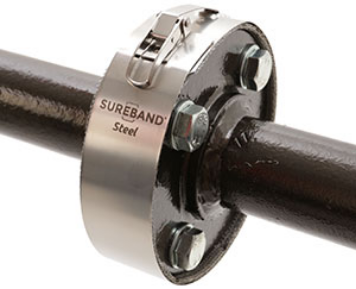Menu
Close Menu
Flange spray shields are used in a variety of industries where their primary application is the prevention of mist formation and dangerous/harmful spray-outs resulting from failing pipe joints. Controlling these dangerous leaks or sprays of toxic, corrosive, and hazardous liquids such as acid, oil, or steam is imperative to maintaining a safe and manageable workspace.
This band is perfect for fuel, hydraulic oil, and steam protection,

This shield design comprises a steel band and an internal layer of steel mesh which is compressed against the flange itself. This mesh, which is crimped along the center to fill the gap between the two flange faces, is critically important. It quickly and efficiently diffuses the spray-out, resulting in a safe drip-release. All our shields are tested on our hydrostatic pressure test facility, test certificates available on request.
The internal mesh is compressed against the flange and prevents direct and lateral spray. The liquid pressure inside is rapidly diffused, resulting in a safe drip-release.
SUREBAND Steel is quick to install and typically used on high pressure pipe lines. It is ideally suited to Steam / Oil applications & has been leak tested at various orifice sizes at pressure up to 335 Bar. It can be re-used in the event of a leak, thus providing a long term solution.
High pressure steam leaks have been responsible for severe personal injury. It is critically important to use only safety shields suitable for the temperature and pressure. Additionally, the design must have the ability to diffuse high pressure.
Fuel oil, lubrication oil, thermal oil & even diesel under pressure, can represent an explosion hazard if the leak forms a "Mist" or "Vapor cloud" that later ignites. Flange and Valve Guards can reduce this risk by controlling the spray out, condensing the vapor into a liquid and producing a safe drip. Many customers have used our Guards to reduce / re-classify ATEX hazardous area as a part of a DSEAR review.
Fuel oil, lubrication oil & thermal oil on power generation plant can represent considerable risk. If a pipe joint breaks and a liquid spray out comes into contact with a hot surface it can easily ignite. Engine rooms with confined spaces are particularly susceptible.
High pressure Gas leaks can cause Jet fires that can reach 10's of meters in length, causing considerable damage & are extremely difficult to control. Our flange guards have been used in the offshore Oil & Gas industry, to prevent the release from forming a concentrated "jet". The Flange guard results in a diffuse cloud that is much easier to detect with the site's fixed point gas sensors.
Liquefied Natural Gas (LNG) is a natural gas containing methane which, when converted into a liquid state, is not explosive and cannot ignite.
Why is it converted to LNG?
Natural gas is converted into LNG as it is much easier to store and transport, particularly as it requires about 1/600th the volume of natural gas.
For LNG to be used as a gas it first needs to be converted back from a liquid state to a gas state. This is done at regasification plants.
How is LNG Transported?
From its initial processing to convert from a natural gas to LNG, LNG will pass through numerous processes from treatment and liquefication plants to storage, shipping then into final storage before regasification.
Is it explosive?
Although in its liquid state LNG is not explosive and cannot ignite, if vaporized and mixed with air it becomes combustible. This can occur if LNG were to leak from a faulty flange joint in a pipeline during movements between processing, storage, transportation and regasification. The LNG would vaporize rapidly at which point if it reaches a source of ignition would catch fire.
How can I mitigate risk?
Liquified Natural Gas (LNG) projects have numerous applications for safety shields, whether it be the cryogenic LNG process itself or one of the many other chemicals used.
The flange joints along the LNG lines themselves need to be shielded to prevent a jet release which would otherwise permit LNG vapor to mix with air and become combustible. This can be done by installing spray safety shields on flange joints stopping the formation of a mist/vapor cloud.
Flangeguards has successfully delivered many thousands of safety shields for LNG applications on projects all around the world. Installation of Sureband Steel spray safety shield to the flanges of pipelines at LNG processing plants and storage facilities control LNG spray out, preventing risk of fire and explosion.
If you have questions please don’t hesitate to contact us or look into our knowledge base to help find the right answer. We look forward to exceeding your expectations in both quality and service.

Getting To Know: Sureband® Clear
Flange spray shields are used in a variety of industries where their primary application is the prevention of mist formation and dangerous/harmful spray-outs resulting from failing pipe...


SureBand® - The Innovative Safety Spray Shield
APG and Flange Guards have teamed up to bring the best selling safety spray shield from across the pond here to the United States. This safer, quicker, and better solution...

Written By:
Please Fill Out This Form To Be Contacted By An Expert